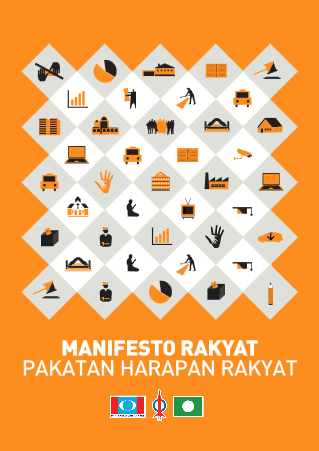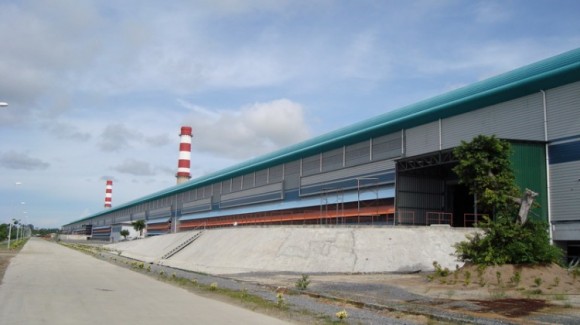
The Pakatan Rakyat manifesto
THE Pakatan Rakyat (PR) released its manifesto amid much fanfare at its national convention on 25 February 2013. The coalition promises to raise Malaysian household incomes to at least RM4,000 a month, increase the minimum wage to RM1,100 and create one million jobs should it come into power.
On the environmental front, the federal opposition pledges to halt the Lynas rare earth refinery’s operations in Gebeng, Pahang, review a multibillion petrochemical project in Pengerang, Johor, and the mega dams in Sarawak. It targets to reduce traffic congestion in the Klang Valley and other major cities by 50% during its first term via investments in public transport. Furthermore, it says it will reform existing logging laws and activities.
Granted, the manifesto is an improvement from Buku Jingga, the common policy platform the PR unveiled in 2010, which neglected the environment and indigenous rights entirely. But it remains lacking in many areas. What else does the PR need to consider to demonstrate they are able to plan for the future and provide sustainable development if voted into power?
Food security
The PR laid out several measures to reform our economy but completely ignored the agriculture sector in its manifesto. This is problematic as Malaysia has become a net importer of food. The country spent some RM221.8 billion on food imports in the past decade.
We have chosen to specialise in cash crops such as oil palm and rubber at the expense of food crops, according to Professor Dr Fatimah Mohd Arshad from Universiti Putra Malaysia. Nearly 84% of our agricultural land is used for export crops, with oil palm taking the lion’s share of 63.4% in 2005, she pointed out in an article, Global Food Prices: Implication for Food Security in Malaysia, co-written with Anna Awad Abdel Hameed.

Professor Dr Fatimah Mohd Arshad (Source: crrc.org.my)
With supermarkets easily available around town, living in the city creates an illusion that food supply remains abundant. But the rate of global population growth has long surpassed the rate of agricultural production, Fatimah and Anna Awad noted. Global food prices will continue to rise as an unpredictable climate further reduces crop yields. Low-income households, who spend the bulk of their income on food, are the most vulnerable to food price hikes.
What will the PR do to reform our agricultural sector and feed Malaysia’s growing population, which is approaching 30 million people, with nutritious, affordable food? What steps will it take to encourage organic farming and sustainable fishing practices? How much will it invest in agricultural research and development? These are just some of the questions the PR needs to deal with.
Renewable energy
Another important sector neglected by the PR in its manifesto is the power industry. Aside from a pledge to scrap independent power producers’ gas subsidies and divert it to lower electricity tariffs, the coalition makes no further mention of the energy sector.
Despite it being a necessity in modern life, some Malaysians, particularly indigenous people and communities living in remote areas, still do not have access to electricity. What will the PR to do ensure every citizen enjoys reliable, affordable power supply?

Datuk Seri Peter Chin (Source: peterchin.my)
In the face of depleting local gas resources, what will the PR do to ensure Malaysia’s energy supply? Will it import more coal? Will it consider nuclear as an option? How much will it invest in renewable energy sources such as solar, biomass or other options?
In addition, the level of Malaysia’s energy consumption versus productivity remains low compared to countries like Singapore and Japan. What innovative measures will the PR implement to cut wastage?
Meaningful public participation
The PR also needs to assure the public that it will hold genuine public consultations before approving major projects. Decades of local governments approving “development” projects without taking into account the existing capacity of roads, drains and other infrastructure has resulted in traffic congestion and flash floods becoming the norm. Coupled with the lack of green spaces, the quality of life in most cities is deteriorating.
Proper public consultation and provision of information will help towards gauging the potential environmental and social impact of a proposed project. It is thus surprising that the PR’s manifesto is silent on the abolition of the Official Secrets Act and the enactment of a Freedom of Information Act (FOIA). Some PR politicians said the manifesto should be read together with the Buku Jingga, which does mention freedom of information. But wasn’t the manifesto built on the Buku Jingga? How is it that the FOIA was excluded?
Comprehensive government
There are many other environmental issues a PR federal government will have to face. For instance, whether controversial projects already in operations, such as the gold mine in Raub and aluminium smelter in Sarawak, will be reviewed; and what to do about the increasing occurrence of flash floods and how to work with our regional neighbours to avoid the yearly haze.

The aluminium smelting plant in Mukah, Sarawak (Source: unireka.com)
Should it come into power in the upcoming elections, the PR needs to address these elephants in the room if it is serious about delivering the best to Malaysians




No comments:
Post a Comment